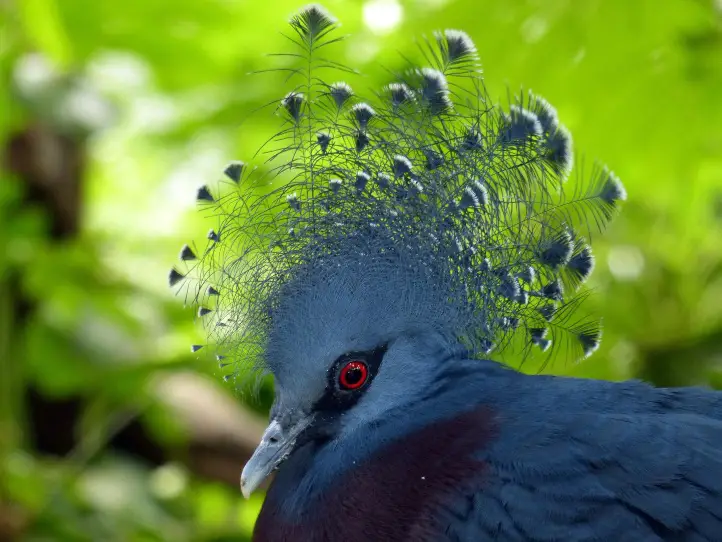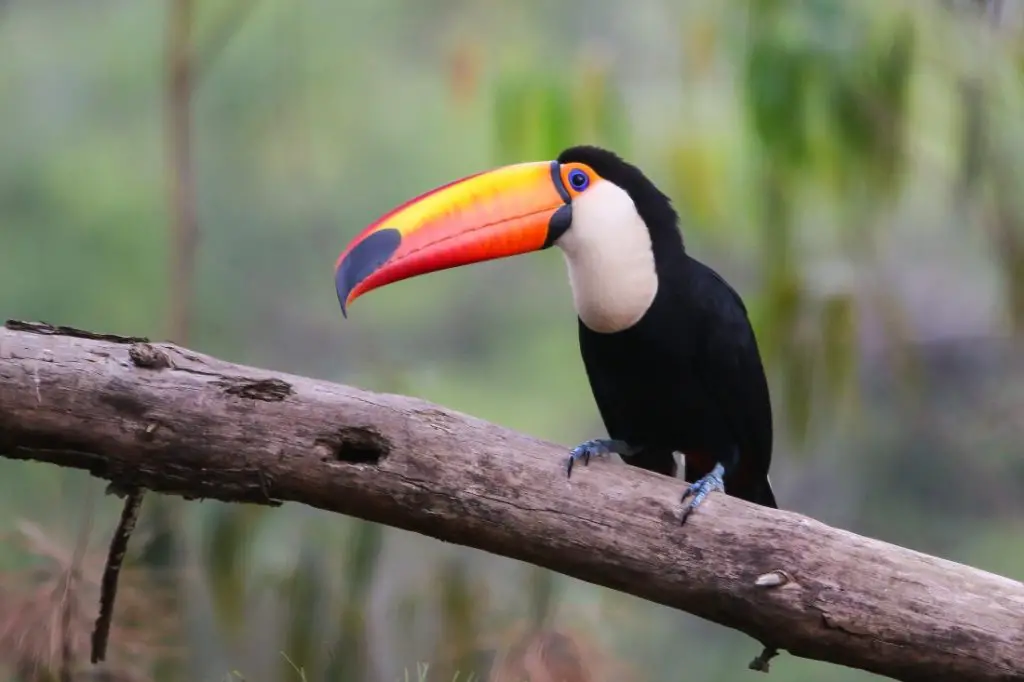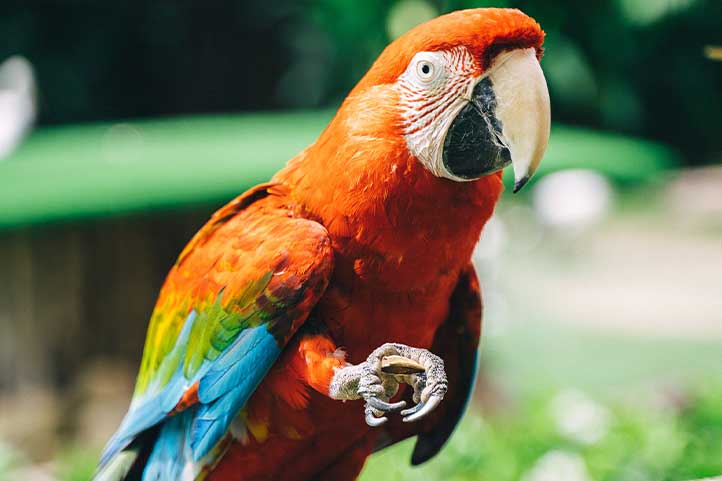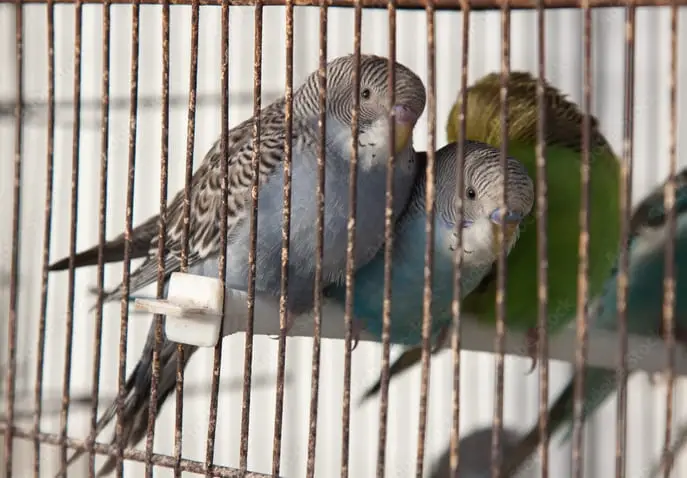Translated by Nick R
We refer to exotic birds as those that are in a place where they shouldn’t be, which implies that they were taken from their natural habitat. It’s common that they don’t share characteristics with the endemic birds of an area, and this may have serious legal consequences and impact on the environment, where they are introduced and also where they are taken from. As keeping them can be a complicated task, read on for more details.
Table of Contents
What are exotic birds?
To help you understand a bit better what the term “exotic birds” refers to, you have probably seen people taking care of birds such as Amazon parrots, African grey parrots, or cockatoos; they are all exotic because they were taken from their habitat to be kept in places they do not belong. In this case, from the jungles of South and Central America, Africa, and Australia, to Europe or North America, where they are not even adapted to climatic conditions such as winter.
Another instance to identify an exotic bird is its colorful appearance, unique and less likely to be found, such as the Crested Pigeon (Goura victoria) that has a sky blue color, reddish breast and abdomen, and a striking crest ending in small, white-tipped fans.

Are exotic birds difficult to care for?
For people who have never cared for birds or lack specific knowledge, it can be quite a complicated task. Unfortunately, these birds, unlike other pets such as dogs or cats, have not gone through a domestication process that may allow them to live better in captivity, which is why their care checklist is extensive and requires a lot of time, patience, space, and even money.
Some aspects that make exotic birds difficult to care for are:
Space
Depending on their size, they will require a lot of space to live. Ideally, they must be able to move freely in the place where they are; as expected, their natural way of moving most of the time will be flying.
Diet
Many people commonly think that a bird only needs seeds when taking care of it. This is not true though, in the wild some of them will have a variety of food sources to supplement their dietary needs depending on the type of diet they have and based on their physical characteristics, especially their beak.
Exercise and recreation
This is related to the same space I told you about before; however, space is not enough, believe it or not birds and poultry are very intelligent, so taking care of it will not only depend on them having food, water, and home but also that it can have access to perches, toys to play with and if possible, companions of the same species to interact with, especially if it is a gregarious bird.
Veterinary Care
It can be somewhat complicated to find veterinary care for our exotic pets, not only for birds, but also for reptiles or fish, so getting it can be difficult to obtain, even because of the cost of access to it.
Also, it is important to point out that even if the birds are well cared for, they are less likely to get sick, it can happen without even realizing it, so annual or periodic check-ups are a must.
What to do if you have an exotic bird?
There is no need to be alarmed here. If you have been taking care of one of them for a long time and you know the necessary care to keep it well. You must continue to do so until the last moment because unfortunately, the species kept in captivity can hardly live again in the wild, if on the contrary you adopted one or found it, you can do the following:
Get in contact with bird sanctuaries or shelters
A smart decision would be to go to bird sanctuaries or shelters, usually non-profit organizations, foundations or NGOs that are concerned about the care of this type of animal and where there is a whole expert staff on the subject; they have the conditions to care for them.
What is good about these kinds of places is that they often have volunteer programs that not only will benefit from your help but will also give you the opportunity to learn about the care of birds, their importance in ecosystems, and some other things that may surprise you.
Visit a specialized veterinarian
This option is also a good idea, veterinaries usually have a wide circle of contact to approach in any situation, which of course, involves the welfare of an animal.
At the veterinarian, not only will they let you know the conditions of your bird, but they can also help you look for experienced people interested in taking care of the bird. Sometimes they take care of the bird themselves without any problem until they can leave it in good hands.
Give it up to experts in exotic birds
As well as sanctuaries and shelters, there are people who, out of love for animals, dedicate themselves independently to taking care of exotic, abandoned, or sick birds. If you are lucky enough to find one with a good reputation and a good place to take care of them, don’t hesitate to leave it there, although in these cases it is also important to know if a person needs a special permit or license to be able to do this work.
Why shouldn’t you take care of or adopt an exotic bird?
Some exotic birds have become very popular, one of them is parrots or so-called Psittaciformes. Sadly, they have already become a species introduced in several countries of the world to be kept in captivity, which means that in most cases they are no longer taken directly from the wild, but all of them have already lived in homes or hatcheries.
The problem with adopting exotic birds is not knowing their origin: where were they taken from, and how did they end up in a pet store or in the hands of a specific person? This is an important question to ask yourself given that, unfortunately, species trafficking exists in the world and it involves money, illegal activities, mistreatment and inadequate care of the species in order to be sent from one place to another without airport controls noticing it.
According to the WWF, a non-governmental organization (NGO) created for the care and conservation of the environment, between 10 and 20 billion euros a year are moved in the world due to species trafficking, which puts it at the same level as drug and arms trafficking.
The IUCN red list
It would be good for you to check the status of an exotic bird on the IUCN Red List, a list created by the International Union for Conservation of Nature, which includes the state of vulnerability of animals and plants. Here you can not only see if it is in serious danger of extinction but also the reason for its status, the places in the world where it is found or from where it has disappeared and other resources that can help you understand the situation.
You can take a look at the article about why parrots are endangered.
Conclusions
Although in this blog we have talked about a variety of exotic birds, it is important to emphasize that all of them have been written with the purpose that those who have them in their care are aware of the responsibility that comes with having them and the complexity they have to have a good life. However, we also remind you that not all the time we will have the ability, the means, or enough time to do it. If this happens to you, we hope that this blog has oriented you a little about what to do, to know how you can continue taking care of it in the best possible conditions.
Related blogs
Advantages and disadvantages of keeping a bird as a pet
Which bird species you CAN and CAN NOT keep at home as a pet


